Community Council Faces $20K Budget Gap
Town Board assistance requested
By Robert Lynch, February 24, 2023
“It’s not a balanced budget, and I’d like a balanced budget,” Enfield Community Council Board member Debbie Teeter told the ECC’s Board of Directors at its annual meeting Thursday. Teeter presented—and the Board then approved unanimously—a 2023 Budget containing a nearly $20,000 shortfall between projected revenues and expenses.

Teeter indicated she intends to ask the Enfield Town Board to close the funding gap with a special, one-time appropriation. She said the funds could be drawn from money given Enfield under the federal government’s American Rescue Plan. Teeter said she may have the request ready for the Town Board’s March 8 meeting, or else present it in April.
“We need some money this year, and I will probably need some money next year,” Teeter acknowledged. She later suggested ECC might request a $10,000 special appropriation in 2024.
ECC President Cortney Bailey blamed the pandemic for revenues lagging behind costs. “We’re getting there,” Bailey claimed, “but we should have been there two years ago.”
Bailey and Teeter explained that the several years of COVID-related shutdowns and social restrictions reduced projected event bookings for ECC’s recently-purchased community center, the former Living Water Church. And COVID also substantially cut the number of participants at ECC’s summer day camp, or else suspended the camp altogether.
As adopted by the agency’s Board Thursday, the ECC Budget projects this year’s expenses at $163,930, and revenues at $144,502. Projected revenues would rise by nearly 26 per cent from moneys received in 2022. Budgeted expenses would climb by only 1.5 per cent.
The ECC Board has taken an optimistic outlook for its year-ahead event bookings. Its budget projects a more than seven-fold rise in building revenues. Rental for the community center’s “Great Room,” the former church sanctuary, would rise from $700 collected in 2022 to $7,150 projected for 2023. ECC predicates the increase, in part, on its hopes to host five weddings and five “celebrations” during the current year.
While ECC’s leadership regrets the need to seek a short-term Town Board bailout, Teeter acknowledged that the recent past has proven far worse than the near future appears to look.
Largely due to depressed revenues, ECC incurred a more than $46,000 financial shortfall for the year just ended. Teeter said the Community Council had to dip into long-held financial reserves to close last year’s gap.
Under its multi-year contract with the agency, the Town of Enfield, according to the budget, will provide the ECC $52,456 during 2023. This taxpayer subsidy constitutes ECC’s largest single revenue item. Camp fees, at a projected $41,275, would provide the second-highest revenue source.
Any supplemental Town funding would be in addition to the assistance provided under contract.
****
Also at its annual meeting Thursday, the ECC Board amended its bylaws to expand agency Board membership from its current nine members to a maximum of 11 directors.
“This building is a huge responsibility,” Debbie Teeter explained. “The Board is too small now for the building.”
Some on the Board, including Teeter, briefly considered an expansion to as many as 13 directors, four more than at present. But ECC President Cortney Bailey preferred a go-slow approach, observing that expanding the board too much too fast could lead to problems obtaining a quorum at meetings. Under its rules, at least half of those appointed directors would need to attend a meeting for ECC to conduct business.
“There are things (like) too many cooks in the kitchen,” Bailey remarked, the president saying she’d prefer more active volunteers participating in ECC activities rather than appointment of an exceedingly large Board. “I’d really rather go slow and get the quorum we need,” Bailey said.
As part of its annual business, the ECC Board reappointed six of its current members to new, two-year terms. No one was appointed to the two additional slots the ECC created.
And annual meeting attendees took time to bask in the success of ECC’s most recent event, the “Grown Up Gala,” a semi-formal prom for adults, the Gala held for the first time February 11. Some 40 people attended, including up to a dozen couples.
“This qualifies as a very large hit,” Bailey proclaimed.
###
Sampling Site to stay put as Tompkins subsidies end
CMC Exec claims testing efforts saved 181 Lives
by Robert Lynch, February 22, 2023; expanded reporting February 23, 2023
Despite a momentary scare blamed on a CEO’s inadvertent twist of the tongue, Cayuga Medical Center made clear Wednesday it has no plans to shutter its much-heralded and heavily-used COVID-19 Sampling Site at the Shops at Ithaca Mall in Lansing. The testing Site’s operation will continue despite declining numbers of patient samples drawn and the ending of Tompkins County Government’s subsidy to the facility.
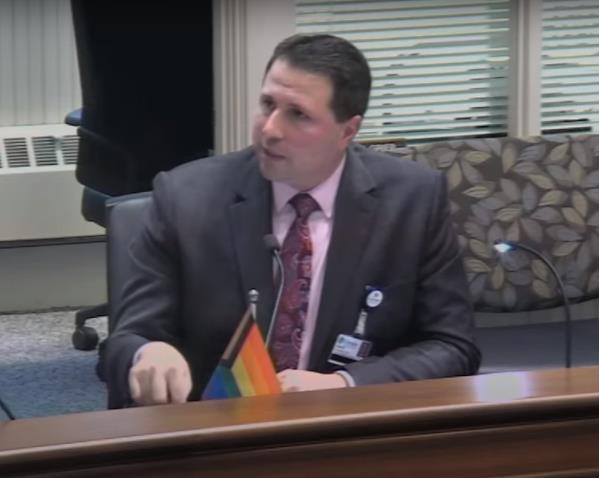
Talk of the sampling site’s future emerged as Cayuga Health Systems’ President, Martin Stallone, praised the three-year old sampling effort and his hospital’s role in it to the Tompkins County Legislature’s Health and Human Services Committee.
“We were several times more tested and had a several times lower positive rate than the next highest county,” Stallone said, the executive blanketing the committee with comparative statistics and a step-by-step timeline chronicling how Cayuga Health’s local sampling effort began in March 2020 and wound to the present three years later.
Though Tompkins County financial support for the mall-based sampling center ended in December, Stallone did not at Wednesday’s meeting ask County lawmakers for any more money. And neither did committee members raise that possibility.
Rather, the direction of Stallone’s half-hour briefing became one of COVID viewed through the rear-view mirror. He reported Cayuga Health performed more than 2.7 Million COVID-19 tests during the nearly three-year period. 279,000 of those samples were drawn at the Lansing mall’s drive-through site. Many more were performed on college campuses. Tompkins County funded the cost of more than 75,000 of the tests.
“Those funds that came through those tests paid for more than simply the test,” Stallone explained, the administrator revealing, now in hindsight, the rather fungible nature of Tompkins County’s subsidies. County funds paid, he said, for “the development of the test. It paid for the drive-through. It paid for a lot of the vaccination efforts that we undertook.”
Tompkins County began subsidizing the CMC testing program in August 2020; five months after the pandemic began. The Legislature initially transferred $300,000 from its Contingent Fund to the testing program for what started as a 10-week trial run. The subsidy enabled local residents without qualifying insurance to obtain COVID-19 tests free of charge, thereby avoiding trips to state facilities in distant cities.
Over time, the federal government assumed a sizable, nearly total, share of the cost. Yet periodic local appropriations still proved necessary. Tompkins County made its last recorded draw from the Contingent Fund, $200,000, in June of last year. In July, Washington scaled back its subsidies, and Tompkins County ended its own contributions at year’s end.
The lack of governmental support, coupled with the declining numbers of patients requiring the tests, had raised the prospect that CMC might scale back its efforts, or perhaps even close its mall-based facility altogether. During a conference call with municipal officials February 2, County Administrator Lisa Holmes said she was not aware of what CMC planned to do.
In his presentation to the legislative committee Wednesday, CMC executive Stallone maintained that the testing program has returned quantifiable rewards not only in community health, but also in economic resiliency.
“A positive test is a positive test,” Stallone conceded. “But what it (the testing program) really did was equip a public health response that allowed those individuals to confidently isolate or confidently not isolate. And so they allowed our economy to continue to run.”
The statistics most likely to break out from Stallone’s half-hour legislative briefing remain figures one must accept with a degree of caution and the clear recognition that Tompkins County stands in a place far apart from the rest of this state because of the overwhelming dominance of college students.
The CMC-collected figures showed Tompkins County with the highest COVID testing rate in the state and the lowest per capita percentage of COVID-19 deaths. The data showed that, on average, a Tompkins County resident was tested for the disease more than 29 times, and that the positivity rate of those tested was only 0.87 per cent, far below the statewide average.
“The cumulative positive rate was the lowest,” Stallone said, “because we did more surveillance testing than anyone else.”
But CMC cannot take all of the credit. Recall that for most of the period, Cornell demanded its students—many of them healthy students—get tested for the disease, sometimes weekly.

And our county’s low mortality rate—only 100 persons died in a county of 105,000 (0.095 per cent)—also deserves clarification. Yes, testing matters. But so, too, does Tompkins County’s high vaccination rate, its residents’ masking compliance, and the fact that so many of us here are so young.
Comparing Tompkins County’s COVID mortality rate to the statewide average led Stallone to claim that local efforts saved nearly 200 lives that would otherwise have been lost.
“If our COVID mortality was average, we would have lost 181 more people than we did based on our population,” Stallone told the committee. “So I think that’s something that I think this body should take credit for.”
“This is an example of where investments were made and lives were saved because of that investment,” the hospital CEO asserted.
But did age matter? Newfield legislator Randy Brown asked the question.
“So you do generally have a younger, healthier population,” the hospital chief conceded. “But I don’t think that accounts for everything.”
Martin Stallone advised the committee—albeit erroneously—that college undergraduates generally don’t count in Tompkins County’s population totals, except, he said, when they live locally or attend graduate study. That may have been true when Dr. Stallone, as he recalled, resided as a student in Cornell’s Clara Dickson Hall. But the census now counts undergrads as local residents in its totals.
Martin Stallone made a second error. And when he did it briefly led any observer (including this writer) to infer that the mall-based sampling will imminently close; or for that matter, that CMC had already shuttered it surreptitiously.
At the end of his presentation, with his PowerPoint slide indicating progress made in February 2023, Stallone stated, “We actually closed the COVID testing at the mall with the (testing) totals that I listed before, 2.77 million tests.”
This writer dutifully reported the CEO’s words, inferring probable closure, only to retract that implication later Wednesday afternoon after the hospital corporation’s Vice President of Marketing and Communications clarified.
“If I said it incorrectly, I apologize,” Melissa Tourtellotte conveyed her boss’s correction and contrition. “What Stallone meant to say,” Tourtellotte rephrased, was that the analysis of sampling results—not the sampling itself—is being transferred from a Cayuga Medical site on Brown Road, its “Innovation Lab,” to CMC’s hospital on West Hill.
“It will be an invisible change to the public,” Tourtellotte said. She indicated that sampling for COVID-19 will remain in place at the mall for the indefinite future.
Tourtellotte’s reassurance ended two hours of journalistic bewilderment arising from the fact that the site’s potential closure didn’t square with information posted on the CMC website. And staff at the sampling center’s registration call center knew nothing about any locational change.
In the County Legislature’s chambers, committee members never acknowledged the administrators gaffe, nor reacted to the potential news. Instead, they showered CMC with praise for its accomplishments.
Tompkins County’s COVID response and its vaccination effort was “kind of thrilling on top of this terrible thing that was going on,” Health and Human Services Committee Dan Klein offered as a rather odd kind of compliment for a pandemic response.
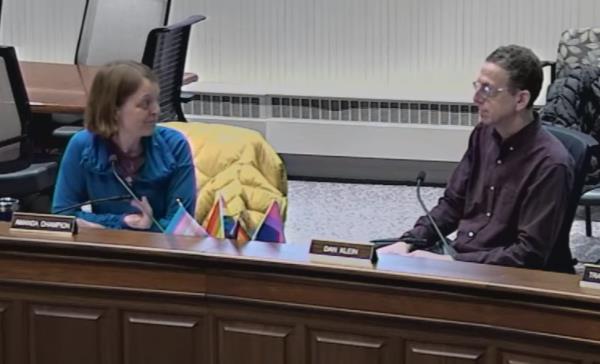
“People have used the word ‘hero’ when it comes to the pandemic,” committee member Amanda Champion remarked. “And as you were describing it,” Champion told Stallone, “I thought, like, my gosh, there were people in these labs like actually doing the work, like that’s so amazing. And I’m so grateful that our county was supportive of that.”
What lessons were learned, Randy Brown asked.
“We certainly have lubricated our agility joints,” Martin Stallone responded. “We have practice in thinking out of the box and being bold.”
“You’re always fighting the last war,” Stallone acknowledged. “So the most challenging public challenge is the one we’re not expecting. I think if COVID happened again, we’d do very well. I hope we would do as well with a novel threat that we haven’t experienced yet.”
###
Hey, New York: You Owe Us!
Locals move to block Albany’s Medicaid money-grab
by Robert Lynch, February 21, 2023
There’s an old tax-time adage: “What Washington giveth, Albany taketh away.” And now, with one costly, soon-to-be-assessed mandate, it’s as plain as the eye can see. And you may feel the bite next January when you pay your county tax bills.
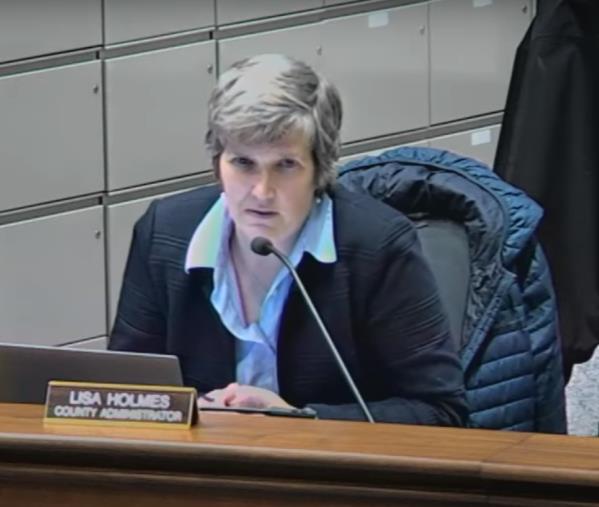
With limited debate and by a unanimous vote, the Tompkins County Legislature Tuesday urged New York State to preserve the intent of Congress and not allow state regulators to hijack supplemental federal Medicaid spending that locals insist counties like theirs were always supposed to be paid.
“We received notice recently from the Association of Counties that based on their recent conversations with the Governor’s Office (that) it does not appear there’s an appetite to restore these pass-throughs for 2023 or at any date in the future,” County Administrator Lisa Holmes notified the Tompkins County Legislature at its Tuesday night session.
“This is not pretty,” Dryden Legislator Mike Lane later observed.
Holmes’ financial warning was sobering, and the consequences of what we taxpayers could suffer are dire. A Department of Social Services number-cruncher told Holmes that should State fiscal managers hold true to their plans, approximately $610,000 or more could be cut beginning in April from New York’s Medicaid disbursements to Tompkins County. An additional $1.5 Million could be cut in 2024.
“If enacted,” said Holmes, this year’s cut “would mean the consideration of hiring delays, or a hiring freeze, stopping the purchases of larger pieces of highway equipment, and it will also impact projections for what we can afford going into negotiations with our bargaining units.”
And beginning next year, Holmes warned, taxpayers, too, could feel the pinch.
In 2024, “we’d start out the budget process immediately with a three per cent increase in the tax levy without some further action being taken,” Holmes said. Keeping within the state-specified (and largely aspirational) tax cap, she said, could prove next to impossible.
“We need to underscore how serious this is for our county’s budget and all county budgets across the state,” Holmes warned.
The circumstances that led to this suddenly-erupted financial crisis are of the kind bound to make any tax-weary New Yorker mad as Hell. And they stand as just another example of Albany’s budget-balancing, pass-the-buck greed.
Legislators were told that when Congress adopted, under the Affordable Care Act, its “Enhanced Federal Medical Assistance Percentage Fund to Counties” (or so-called “ACA E-F-Map Funding”), Washington intended that the states, including New York, that require counties to share a portion of Medicaid burdens, would themselves pass some of the ACA supplements down to the local level.
“And in fact, New York State agreed to do that when they first received this money,” legislator Rich John told his legislative colleagues.
But something changed along the way, he said. Somehow, all those millions in county pass-through funds got gobbled up in the inner-works of Albany’s internal bureaucracy. And now it seems the State has simply chosen to keep the money for itself.
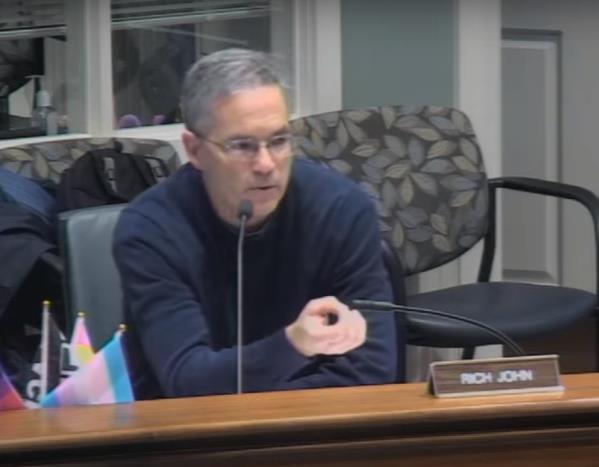
“They’re saying they’re reconciling the payments,” John stated, the legislator employing one of those typical eye-glazing terms bureaucrats use. “But that has been a completely opaque process,” he continued. “We haven’t seen the money. And now the current proposal is to just have the State keep all the money, while asking for more services; enhancing the services. And we’ll be paying the cost locally.”
“So the hit comes in more than one way,” Rich John concluded. “And it’s not what the federal Congress intended. So that’s why it’s pretty upsetting.”
One week before many on the Tompkins County Legislature will troop to Albany for a meeting of the New York State Association of Counties, those same legislators adopted the Resolution Tuesday calling upon the State to reverse-course and restore Congress’ intended pass-through of the ACA money to local coffers.
“The Resolution you will be considering tonight is an important step in advocacy to try to stop these cuts from taking place,” Holmes said.
“Lisa’s comments were pretty compelling,” Budget Committee Chair Deborah Dawson, a fiscal hawk, told Tuesday’s meeting. “We’re just going to have to put as much pressure on our State Legislature as possible to override this proposal by the Governor,” Dawson said.
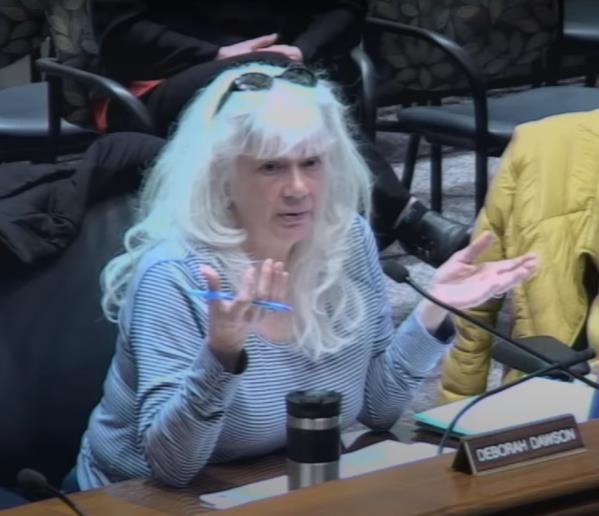
But in typical Albany it-wasn’t-my-fault fashion, Governor Kathy Hochul may have slyly kept her fingerprints off this major-impact money grab. The Executive’s proposed budget, we’re told, never referenced the funding holdback, and all the real blame may be buried down in some regulatory rabbit-hole, virtually impossible for the Legislature to excavate or ever correct.
“This may be out of their hands,” Mike Lane worried.
Lane pointed out that New York is one of only two states in the nation where local counties still bear a partial burden for Medicaid funding, subsidies that underwrite medical care for low-income residents. And of those two states, New York counties, Lane said, pay the highest percentage. The Dryden Democrat equated New York’s mandated county contribution to an effective statewide property tax, but a tax for which Albany-based lawmakers never get the blame.
New York’s counties, Lane complained, “get treated like poor relations.” And when it comes to assessing the cost, he said, Albany’s message handed down is this: “You do this, and you raise the money.”
###
The “Death” of a Good Judge
LaSalle, the Democratic Party, and Me
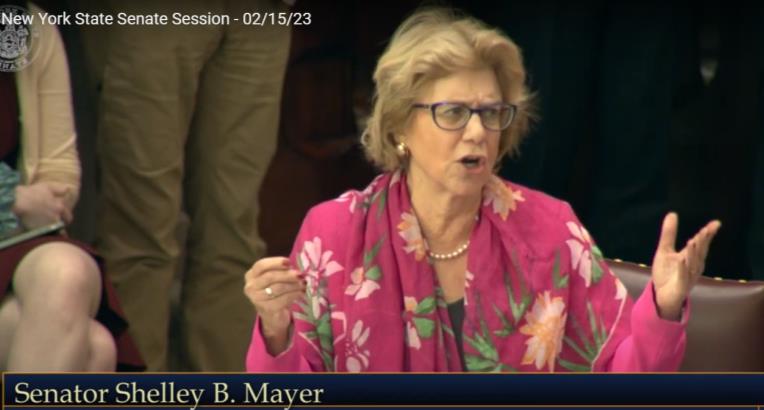
Analysis and Commentary by Robert Lynch, February 20, 2023
Lea Webb, my State Senator, disappointed me last week. So did 37 of her Democratic Party colleagues, members of New York’s upper chamber. Each of them put politics above principle, innuendo over intelligence, and rejected a skilled, experienced jurist, Hector LaSalle, to become Chief Judge of the Court of Appeals, New York’s Highest Court. When they did, dismissing the choice of their own—and my own—party’s governor, Kathy Hochul, they betrayed the public’s trust. And they betrayed mine as well.
With LaSalle’s rejection, I have lost confidence in the majority party that governs our Empire State. The wound that the majority Democrats inflicted on me, and on us, cuts deep. It may never heal. And because the party that holds the votes in Albany to enact our laws and confirm our judges has chosen to walk away from me, I may choose, in time, to walk away from them. The choice of a Chief Judge matters to me. It matters a lot. Hector LaSalle’s rejection may force for me a pivotal course correction.
Governor Hochul, with minimal fanfare, nominated Hector LaSalle to the Court Appeals a few days before Christmas. An expanded State Senate Judiciary Committee, packed last-minute with Hector-hostile partisans, rejected the Chief Judge nominee January 18th. By just one vote, it failed to advance LaSalle’s name to the floor. For weeks, the Majority Leader, Sen. Andrea Stewart-Cousins, and her Democratic allies blocked any prospect of bringing the LaSalle nomination to the Senate floor and to allow all 63 Senators to decide the judge’s fate. Republicans sued, arguing the State Constitution demands a floor vote regardless of the committee’s recommendation.
Suddenly, surprisingly, Stewart-Cousins relented. Last Wednesday, Democrats hastily moved the nomination to the Senate floor, and just as hastily, hugging party allegiances, they voted the nomination down. The 20-39 defeat saw all but one of the Democrats present opposing LaSalle. Just one attending Republican opposed his advancement. Hooray for Democrat Senator Monica Martinez of Long Island. She, alone, had the courage to buck her party and support LaSalle. Ms. Martinez, I do not cast you in with the rest of your sorry lot.
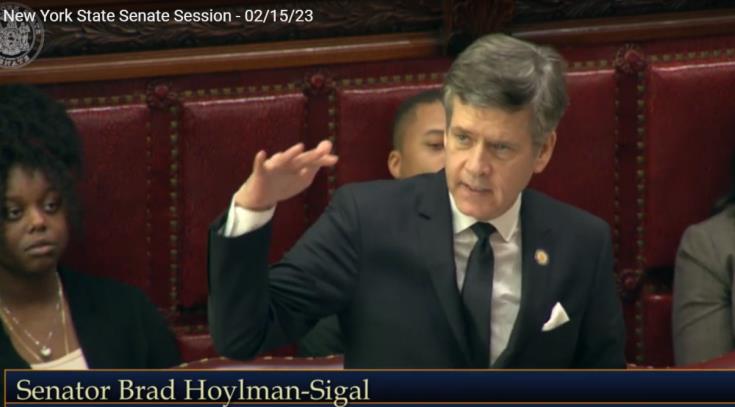
“Haven’t we changed the game in Albany?” Senator Brad-Hoylman-Sigal, Chair of the Judiciary Committee, crowed Wednesday during a partisan-poisoned pre-vote debate. “This is a new beginning for the way we review judicial nominations, all nominations, legislation, all matters of public import. I think that’s something we should be proud of.”
Maybe for you, maybe for Democrats, but not for me. Hoylman-Sigal proved particularly hostile to Hector LaSalle during the committee’s January confirmation hearing. He often snarled at the nominee, never smiling, pointedly faulting LaSalle, and doing so particularly harshly, for LaSalle’s accepting cross-endorsement by the New York Conservative Party in a prior campaign for a lower court’s elective office. One suspects Hoylman-Sigal lives for political combat and for little else. I suspect he has more political sycophants than he has genuine friends.
“We can find a better nominee to lead this Court. And we need to do it ASAP.” Hoylman-Sigal said before he cast his vote against Hochul’s nominee, “because we have a court system that is teetering on the brink of disaster.”
His opinion. Not mine.
Senate rejection puts the nomination of Chief Judge back to square one. An advisory panel will come up with a new list of seven finalists for the appointment, from whom Governor Hochul will select a new nominee. Many on that new list could be some on the old list from which Hochul chose LaSalle. The process could take months. Our seven-member Court of Appeals could remain one jurist short into summer. The Court’s remained short-handed since the prior Chief Judge, Janet DiFiore, resigned under an ethics cloud last July.
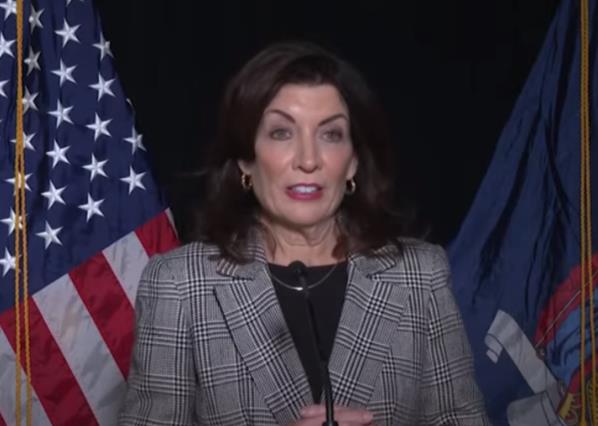
“Now that the full Senate has taken a vote, I will work toward making a new nomination,” Governor Hochul dictated in a transparently terse three-paragraph statement, spilled from her office’s press room after Wednesday’s vote. It had a lick-your-wounds quality to it; focusing on the majority’s concession to a floor vote, rather than lamenting LaSalle’s rejection.
“This vote is an important victory for the Constitution. But it was not a vote on the merits of Justice LaSalle, who is an overwhelmingly qualified and talented jurist,” Hochul stated. She was right.
Some pundits have suggested that the Senate’s rejection of LaSalle could poison the well of intra-party political discourse in Albany, where Democrats hold veto-proof supermajorities in both the Senate and Assembly, and upcoming budget discussions often devolve to those secretive “three men (and now, women) in a room,” smoke-filled confabs, absent the nicotine.
“There’s other issues where you find common interests,” the Governor told an Albany radio host just prior to Wednesday’s vote. “I think that’s what New Yorkers want to occur. Not to have us in our respective corners with our gloves up and ready to fight.”
We’ll see. New York’s bloated, proposed budget weighs in at $227 Billion. It’s due for adoption April 1.
A “Liberal Lion” is what Senate Democrats seek, I wrote in a January 24th commentary on the nearly five-hour confirmation grilling that led to Hector LaSalle’s rejection by the Judiciary Committee. Legal observers see the Court’s residual bench as evenly-split; three judges confirmed liberals, the remaining trio somewhat to their right. So the Chief Judge appointment, to Democrats, becomes an opportunity for a much-sought lurch-to-the-left.
No doubt, last year’s rejection of the Legislature’s Democratic-gerrymandered redistricting maps is not lost on the majority’s mind. Former Chief Judge DiFiore, a perceived centrist-conservative, cast the deciding vote to invalidate those maps. Liberals want nothing more like that in the future. Their progressive agenda, they’d argue, most deserves a true believer to carry their water.
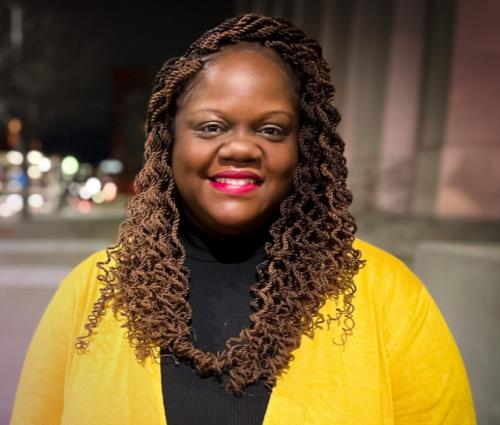
During that hour and 15-minute Senate debate last Wednesday, the shadows of Justices Samuel Alito and Clarence Thomas repeatedly loomed about the chamber.
“We know that at the federal level, our Supreme Court is a complete mess,” downstate Senator Andrew Gounardes asserted. Gun rights have been expanded; abortion rights restricted. “So at a time when this is happening at our national government, it’s even more important that state judiciary, that our state government, be both a bulwark and a beacon, in protecting and advancing the same rights that our federal Supreme Court is so quickly eroding,” Gounardes emphasized.
In Gounardes’ opinion, Hector LaSalle stands too cautious and conservative amidst this legal onslaught. “He saw the law as a narrow tool, and not as an expansive tool, sword and shield to protect the rights of litigants, to protect the rights of workers, to protect the rights of women, and so many others,” the Senator insisted. But note how Gounardes cherry-picks the subset of litigants who matter most to him.
“I met with the judge, and I thought he was extremely nice,” Albany-area Democrat Neil Breslin observed. “I thought he was capable, but he didn’t pass the total test in my estimation.” Breslin, too, voted no.
“There is a context in which the people of this state woke up to realize that judges really matter,” Westchester Democrat Shelly Mayer said in explaining her opposition. “What happened in my district is that people woke up and said, ‘Are you kidding me? Who we pick as a judge really matters.’”
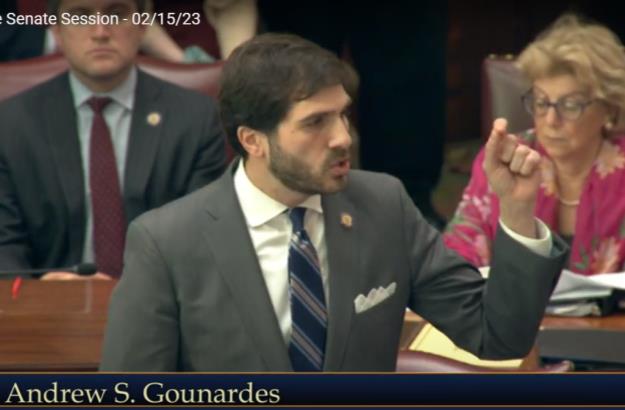
“We’re not asking for a judge who calls balls and strikes,” Mayer tellingly stated, employing the baseball umpire analogy others used. “We’re asking for judges who apply the law and understand the context of what the implication of a decision means for millions of New Yorkers.”
Mayer, like Senator Gounardes, viewed Judge LaSalle’s legal outlook as too narrow. “And a consistently narrow interpretation of the law,” Mayer stated, “really is a risk to our individual constituents.”
Mayer called the day’s decision “impactful and so important.” “We can’t walk away from it because it’s hard; because it’s uncomfortable,” she said. But neither can Mayer, Gounardes or their three dozen fellow Democrats walk away from the political agenda that underlies their action.
Their words clearly amplify intent. They seek not so much a competent, knowledgeable arbiter of legal fairness as they do a loyal judicial lapdog, someone who will stretch statutes like an elastic band regardless of precedent and bend the state Constitution so as to amend it from the bench in ways that liberals find too messy or unpopular to enact through the will of the voters.
And either through ignorance or artifice, LaSalle’s Democratic opponents suggest something else. They seek to hoodwink voters into thinking the New York Court of Appeals holds some magical power to countermand the U.S. Supreme Court. In truth, it works the other way. Yes, a state court may expand constitutional liberties beyond federal standard. (That’s how the Court of Appeals in 2004 invalidated New York’s Death Penalty.) But federal supremacy prevents New York from constricting liberties that the Supreme Court insists the U.S. Constitution protects. The likes of Shelly Mayer may hate the overruling of New York’s concealed carry law. But even if state courts affirm Albany’s patchwork replacement to the law that Justice Thomas and his majority last year struck down, the Supreme Court’s majority could always declare the new law null and void. Mayer doesn’t tell you that, though I’m sure she knows it.
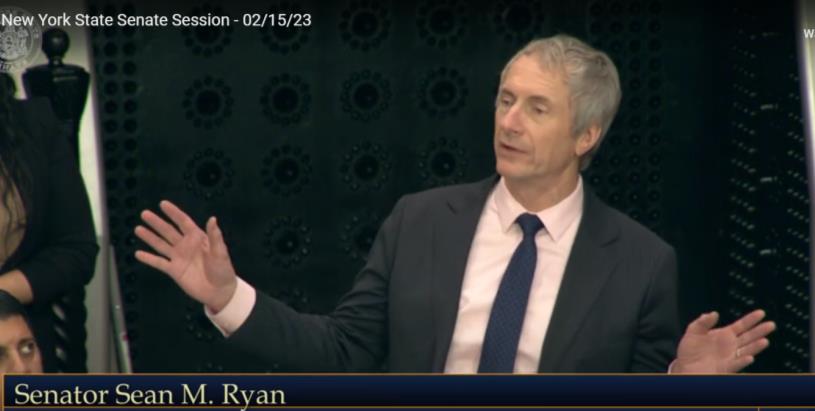
Senator Sean Ryan would impose a straight-jacketed career litmus test upon the next Chief Judge, one Hector LaSalle, a former prosecutor, could never meet. “My prism is someone who’s spent most of his career as a lawyer helping the dispossessed,” the Buffalo-area Democrat told colleagues. “New York State needs a Chief Judge who has a broad vision of the law, has a broad vision of how law affects society, and knows that the decisions of those courts affect everybody in society.”
I’ll credit Senator Ryan for at least being factually correct—albeit evasive—in raising for his rebuke Judge LaSalle’s handling of the one case which liberal critics most distort. It’s Evergreen Association Inc. v. Schneiderman. “The judge went out of their (sic) way to assert the rights of a crisis pregnancy center to somehow give them equal footing to spread disinformation to people in our society,” Ryan stated.
LaSalle’s opponents would like us to think that Evergreen was a holding hostile to abortion rights. When they do, they twist the truth, and it’s time to set the record straight.
When it decided Evergreen in 2017, the mid-level court on which Hector LaSalle sits ruled that the First Amendment’s Right of Association limited the State Attorney General’s reach to subpoena a Christian-aligned crisis pregnancy center’s operational and staffing records in his effort to evict center operations from a medical office building. The Appellate Court’s unanimous holding only limited—it did not block—the A.G.’s efforts to probe whether a volunteer-staffed center that provided sonograms and pregnancy tests amounted to unauthorized practice of medicine.
To assert, as LaSalle’s critics have so brazenly done, that Hector LaSalle’s joining a unanimous bench in this most diminutive crumb of legal procedure somehow makes the nominee anti-choice and unfit to serve, is to steer public sentiment on the basis of a boldfaced lie. Moreover, the strategy postures the anti-LaSalle Senate majority as not so much pro-abortion rights, as actually pro-abortion itself. Taken to its logical conclusion, Senator Sean Ryan and his liberal allies would seem to prefer that medical alternatives to abortion simply should not exist. And by citing LaSalle’s Evergreen holding as a disqualifier for promotion, Senate Democrats imply just that.
Majority Democrats would rather you read only their bumper-sticker, not the case itself. In Evergreen, Judge LaSalle had wisely sought to expand reproductive options, not limit them, albeit on fine-spun procedural grounds.
State Senate Republicans number just 21, their ranks only strong enough to raise a polemic rejoinder. By and large, they backed LaSalle.
“He has applied the law that has been passed by the Legislature,” Nassau County Republican Patricia Canzoneri-Fitzpatrick said in defense of Judge LaSalle and his record. “And that’s the job of the judiciary; to apply the law, not to legislate.”
“I support this nominee. I worked with the nominee. He is an incredible jurist who calls balls and strikes,” Judiciary Committee Ranking Member Anthony Palumbo said in support of LaSalle. “And he’s a plain old liberal Democrat, which apparently isn’t good enough.”
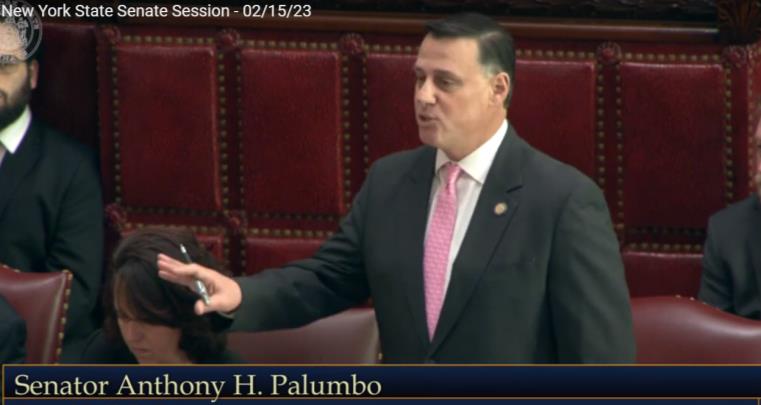
Suffolk County’s Palumbo is the Senator who filed suit to bring LaSalle’s nomination to the floor. The case was argued in court last Friday, with the judge then reserving decision. Some suggest the suit twisted Democratic leadership’s arm just enough to bring about last Wednesday’s vote.
“We seem to have a group of members who think that, well, if we can’t change the Constitution, then let’s change the courts,” Palumbo chided his Democratic opposition. “So we’re now going to pack a court with activists who choose not to follow the law, unlike Justice Hector LaSalle, who simply calls balls and strikes.”
Indeed. “This is a conversation about changing the strike zone, Palumbo’s Long Island Republican colleague Steven Rhoads echoed, Rhoads continuing the debate’s frequent throwback to baseball. “Because what the majority is doing, they’re not interested in somebody calling balls and strikes; they’re interested in somebody who’s going to call balls and strikes the way they want them called.”
Senator Rhoads called the majority’s handling of the LaSalle nomination “an embarrassment.” Staten Island Republican Andrew Lanza agreed.
“I think people are sick of this kind of politics,” Lanza asserted. “I think it’s wise that people back home don’t trust us, any of us, either party, because they see these types of games being played.” The downstate Republican stands wisely aware of how cynical we voters can be.
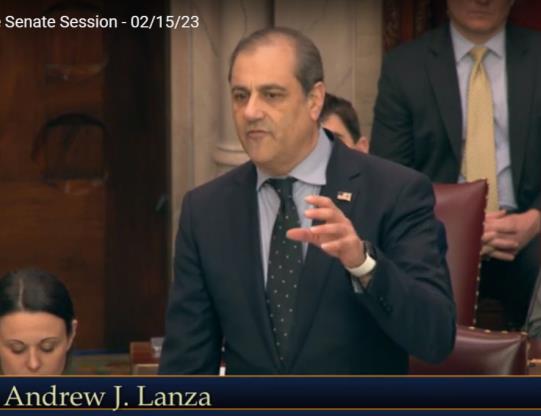
“We all know why the nominee did not come to the floor” in a timely manner, Lanza continued. “It’s because the nominee refused to give the old wink-and-nod that when he’s on the bench, he would refuse to honor the Constitution, and he would pass and support whatever radical agenda that came to his decision-making desk.”
Democrats Luis Sepulveda of the Bronx and Kevin Thomas of Long Island had each supported LaSalle in committee, yet neither attended Wednesday’s session to cast their votes. Perhaps their absence reveals the power of Andrea Stewart-Cousins to close ranks. Or perhaps it reveals something else. No matter. Even had they been present, Hector LaSalle would have lost.
Binghamton’s Lea Webb, Tompkins County’s State Senator, spoke not a word during the February 15th floor debate, the 52nd District representative casting her vote in opposition to the LaSalle nomination, but offering no statement on her office’s website to elaborate on why she did.
****
So Hector LaSalle, New York State’s here-today, gone-tomorrow nominee to lead its Highest Court, retreats to relative obscurity. He continues his role as Presiding Justice of the Appellate Division’s Second Department, one of four regional, mid-level appellate courts in the state, LaSalle’s covering part of New York City and the counties surrounding it. LaSalle won’t serve us, except through the overlapping precedents other regional courts may choose to observe.
Senator Palumbo, meanwhile, presses forward with his lawsuit to demand future judicial nominations reach the State Senate’s floor regardless of how Hoylman-Sigal’s committee treats them. Majority leader Stewart-Cousins’ lawyers asserted in court Friday that the issue is now moot and that Palumbo lacks standing to sue. Palumbo’s counsel counters that the case remains alive as Hochul’s next nomination could repeat the process.
News reports say State Supreme Court Justice Thomas Whelan expressed interest in the case during oral arguments Friday. The judge termed it a “constitutional crisis,” assigning the judiciary “the duty and the obligation… to rule on the constitutional solution.” Though Whalen’s ruling on the merits is imminent, an appeal of any decision remains probable. It could rise to the now ideologically-split Court of Appeals.
“Everybody is paying attention, riveted, to who’s sitting in these seats, who’s sitting in the judiciary, who’s making these decisions,” Stewart-Cousins told reporters following the full Senate’s vote. “So it was not inappropriate for us, with the eyes of the nation and the eyes of the state on us, to look for a nominee that was able to lead the court in this really, really critical time.”
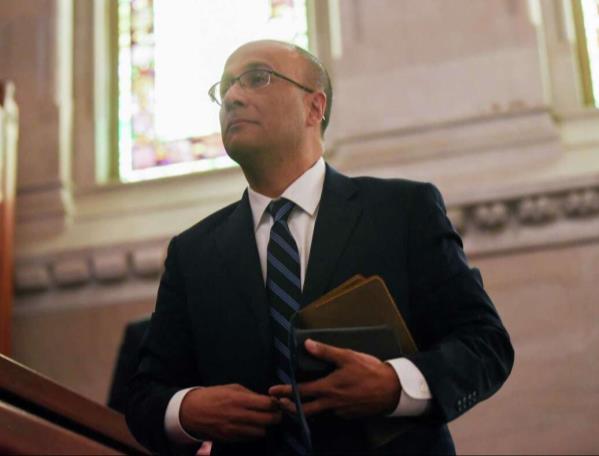
But look at a nominee what way? Should a judge be merely a judge? Or must he also serve as a legislator of last resort? New York Democrats count on your inattention and political outrage to permit them to impose their supermajority muscle over a separate branch of State Government, and to do so in a way that weakens the independent judiciary and transforms the courts into a reliable enforcer of liberal will. Separation of powers matters. Democracy matters. Quite plainly, in the war of words February 15th, Republicans made the better argument. The GOP sought blind justice. Democrats revealed they’d prefer that “wink-and-nod” from behind the blindfold.
Hector LaSalle drove up the Hudson from New York City last Wednesday and sat more or less alone in the Senate gallery, high above the floor, to watch the career opportunity of a lifetime evaporate before his eyes. He sat in silence. He declined reporters’ questions afterward. LaSalle knows he fell victim to an ideological agenda engineered by perfectionist zealots within his own party, Governor Hochul’s own party—and sadly, also, my own party. I hope Hector LaSalle took a deep breath of fresh air as he exited the State Capitol that day. Because inside the chamber, the room truly stunk.
###
Newfield Imposes Campground Moratorium
Town Board Acts to Stand in Second Wind’s Path
by Robert Lynch, February 9, 2023
The mood: “I’m against this,” Rick Bryant told a firehouse room full of his neighbors Thursday. “You could build the Taj Mahal here; you’re still going to be bringing the same people up here.”
“I’m against it,” another man concurred. There’s no local enforcement. “Once you get ‘em here you can’t get rid of them.”
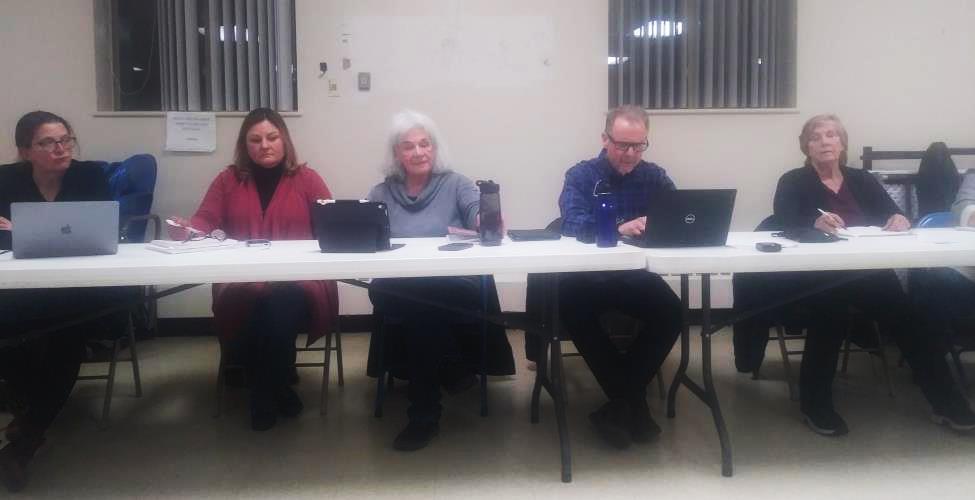
The public sentiment was unanimous Thursday night, and so was the vote, as the Newfield Town Board, following a much-awaited Public Hearing, adopted a “Town-Wide One Year Moratorium on Campgrounds.” It’s a local law unapologetically aimed at halting Second Wind Cottages’ plans to expand its 18-unit tiny house complex for the otherwise-unhoused by adding 25 campsite cabins intended to draw many more of the homeless to Second Wind’s site off Route 13.
And while word surfaced earlier this week that Second Wind may alter its campsite plans in a transparent effort to circumvent what the Newfield Board would adopt two days later, Newfield’s leaders and the residents they represent have signaled that the changes developers propose remain to them unacceptable.
The original campground project, which already has won initial funding support from a majority on the Tompkins County Legislature, would provide a so-called “low-barrier” encampment; an unpoliced, minimally-supervised collection of cabins, which many in Newfield fear could draw to Second Wind’s site serious substance abusers, lawbreakers, and sex offenders.
“I’m worried about the property value of my home,” one Newfield woman told Thursday’s hearing. “Please protect citizens who pay their taxes,” she begged the Board.
And the Town Board responded. It did so quickly. While the Public Hearing consumed about 35 minutes’ time—shorter than had been expected—the Town Board’s response was surprisingly swift. Before voting, Board members confined their remarks to just one or two crisp sentences apiece. Apart from the hearing, the Board’s discussion and vote took less than five minutes.
“We definitely need breathing room,” Newfield Councilperson Joanne James told Board colleagues and her audience before casting her vote to support the moratorium.
“We didn’t hear anybody objecting to this moratorium,” Councilperson Heather McCarty observed.
Councilperson Christine Laughlin, the Newfield Board’s lone Republican, appeared most adamant, critical of Second Wind founder Carmen Guidi’s plans to scatter the campsites behind his auto body shop north of the Newfield hamlet.
“Carmen’s heart is in the right place,” Laughlin acknowledged during the public hearing, “but he’s not looking at the bigger picture.”
“It’s hurting our residents” Laughlin maintained. “Get out of their bubble,” she pleaded of Second Wind’s leadership.

While nearly 30 Newfield residents filled the audience for Thursday’s meeting, only about a half-dozen spoke. Most notable among them was Newfield-Enfield representative Randy Brown, the Tompkins County legislator most critical of both the Second Wind expansion and a legislative advisory committee’s recommendation to allocate $510,000 in County-apportioned Community Recovery Fund grants to construct it.
“Carmen’s heart is in the right place, but it’s bad for Newfield,” Brown said of the campground. “I think they will back away from this proposal and ask for more cottages and the same amount of money.”
And Brown’s prediction is more than just idle speculation. In a surprise announcement at the Tompkins County Legislature Tuesday, County legislator Dan Klein, reading from a prepared statement, disclosed that Second Wind would likely scale back its plans, exchange its campground vision for construction of more stick-built housing on Guidi’s site, and retool its application for continued County support.
“Rather than building 25 structures in a campground-like setting,” Klein informed legislators Tuesday, “they (Second Wind) are planning to add additional cottages to their current 18 cottage facility.”
“The current version of the plan is to build 12 new cottages,” Klein’s statement said.
Klein said the Community Recovery Fund Advisory Committee—of which Newfield’s Brown is a newly-appointed member—would convene March 6 to review a revised funding request that Klein expects Second Wind to submit.
But neither the revised construction configuration nor the special favor granted Second Wind to let it take a second bite from the Tompkins County funding apple please legislator Brown. The Newfield rep says he’ll oppose Second Wind’s expected resubmission, and he asked those at Thursday’s Public Hearing to join him.
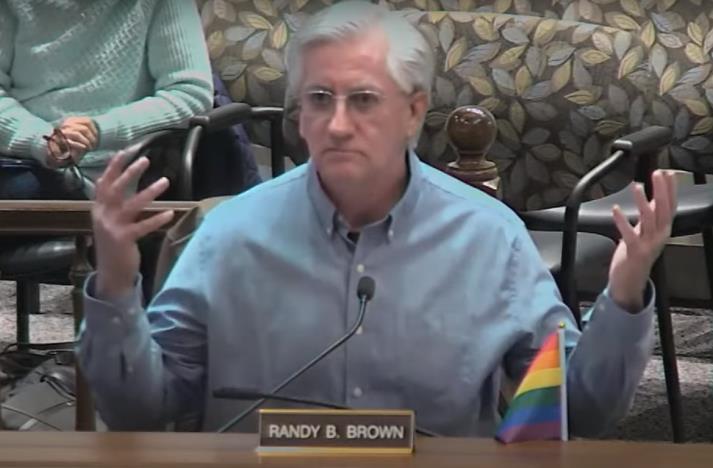
“Come to the meeting and voice your opinion,” Randy Brown told hearing attendees. “They need to hear from more than just me.”
Brown’s key concern about Second Wind’s expansion, a concern shared by Newfield Supervisor Michael Allinger, involves the community’s perceived inability to provide the emergency services that vulnerable Second Wind residents might need, along with the unwillingness of Second Wind to provide them itself.
“I’ve heard from a lot of neighbors,” Allinger informed the hearing. “I’ve often heard concerns of lack of supervision.”
Of Second Wind’s campground project, Allinger opined, “It can’t move forward without better supervision. They’ve lost control.”
As the Town Supervisor’s sees it, Second Wind’s homeless population needs “supervision 24 hours a day, seven days a week.” And Allinger insists that Second Wind doesn’t provide it.
Underlying the concerns of many in Newfield is the fear that by adding the proposed campsites and likely more than doubling Second Wind’s population, Tompkins County, with the City of Ithaca in hand, is unloading Ithaca’s unsolved homeless problem—centered at Ithaca’s so-called “Jungle” behind Walmart—onto their rural community using the rationale that out-of-sight is out-of-mind.
Regarding the Ithaca homeless problem, “the County is solving it by sticking it in Newfield,” resident Aaron Miller told the Town Board Thursday.
****
Disclosed publicly only a month ago, and tweaked during a Town Board meeting January 26, Newfield’s one-year moratorium would direct Town officials and employees not to “begin or continue to review applications for or grant any approvals relating to a Campground within the Town.” The adopted law defines “Campground” as “any parcel or tract of land including buildings or other structures under the control of any person, where five or more campsites are available for temporary or seasonal overnight occupancy.”

The adopted Local Law imposing the Newfield moratorium directly references the originally-proposed, 25-unit Second Wind homeless encampment. The law’s text acknowledges that the campground proposal “has generated significant concern in the Town based on health and safety concerns for people of the Town and those individuals that may be housed in such camps.” Those concerns list “lack of local police, EMS, and other social services in the Town” as well as “the relatively lengthy response times for police and medical services.”
Seeking a legal foundation, language often necessary to stave off a court challenge, the law asserts that the moratorium will give Newfield officials time to rewrite the Town’s 2013 Comprehensive Plan, a document that the law maintains never anticipated the sort of encampment that Second Wind proposes nor the “health, safety, and sanitation concerns that attach to developments that have a substantial number of persons living in a small area.”
Now ratified by the Town Board, the Newfield Campground Moratorium will take effect as soon as it’s filed with the Secretary of State. After Thursday’s meeting, Newfield Town Clerk Karen Miller Kenerson said she’ll file the papers Friday. She said the Tompkins County Planning Department, whose review the law requires before adoption, has already given its consent.
Residents and Newfield Town Board members departed their meeting Thursday in general agreement they’d done all they could, though they remained anxious that despite their best efforts, more battles may need to be fought.
“It’s nice to know we all feel the same way about things,” Councilperson Laughlin told her assembled constituents.
###
“We’re Not Ulysses”
Enfield Planners chart contrasting course in Subdivision Rewrite
by Robert Lynch, February 6, 2023
Iradell Road might as well be the 38th Parallel when it comes to land use regulation. Members of the Enfield Planning Board made the point clear last Wednesday night as they devoted more than two hours’ time pondering intricate, often in-the-weeds revisions to Enfield’s decade-old Site Plan Review Law and Subdivision Regulations.

The Planning Board’s months-long effort stands far from finished. The February 1st meeting produced no firm recommendations. But the session did draw a clear dividing line between the mindset of those in un-zoned Enfield to the south and those who govern ultra-zoned Ulysses to the north, Iradell Road their towns’ common border. The Enfield message was clear: What happens in Ulysses should stay in Ulysses.
“I’m also concerned with making it easier for people to build houses in the Town of Enfield,” Planning Board member Mike Carpenter, a builder, told colleagues Wednesday, cautioning them against over-regulation.
“I know that having just tried to build a house in Ulysses for a young family, gone through the Zoning Review Board, gone to the Planning Review Board, and having their new zoning regulations make us have to build a $75,000 bridge over an existing creek in order to fit into the structure of the zoning thing ruined a really good piece of land because the people on the Zoning Board didn’t want to have houses with less than 400-foot frontage in their Town, which is just crazy,” Carpenter said.
Why was it done?
“I believe the Ulysses stated purpose was to preserve the farmland, and they ruined it,” Enfield Planning Board Chair Dan Walker responded. “That’s Ulysses, and we’re not Ulysses,” Walker stressed.
The Town of Ulysses’ revised Zoning Law, enacted amidst controversy in late 2019, has not proved popular, especially with farmers and with those who seek to build homes in Tompkins County’s most northwesterly town. And it has raised the question of when does a law make a minimum-sized building lot simply too big? When does a supposedly well-intentioned rule run counter to a town’s stated desire to preserve rural character? And when do local politicians’ ulterior motives drive their decision-making?
In effect, when does the lot’s size become so huge that it carves up the cornfields and cow pastures that it was supposed to preserve, turning former farmland into super-sized lawns?
The 2019 Ulysses law, according to Enfield planners, demands not only a 400-foot frontage, even on an off-the-road, so-called “flag lot,” but also sets a minimum lot size of five acres, much larger than the average home requires. And as Carpenter sees it, Ulysses couples misguided regulation with arbitrary application.
“When I went to the Board in Ulysses,” Carpenter complained, “and I said I want a variance, the five old white guys on that Board said, ‘This is what the law says. This is what you gotta’ do. We don’t want to give exceptions. It’s a law. We made it. This is what you got to do,’”
So Carpenter’s client had to build the $75,000 bridge.
“That destroys open space,” Walker replied.
“That’s what it does,” Carpenter confirmed.
Why the no-exceptions Ulysses intransigence? Carpenter inferred Ulysses’ leaders had little interest in protecting rural character. “I heard ‘We are protecting our property values;’ that’s what they were saying,” Carpenter told his Board.
“Rural Gentrification,” Walker quickly branded it.
But Ulysses need not get all the blame. Carpenter argued that other rural Tompkins County towns, Caroline and Danby in particular, are doing much the same thing.
So how should Enfield do things differently? How should hometown planners protect rural character—a stated priority in Enfield’s Comprehensive Plan—while not cutting off Enfield’s nose to spite its face? Carpenter, a former Town Board member, led Wednesday’s debate. And Carpenter looked not only to the future, but also to common sense.
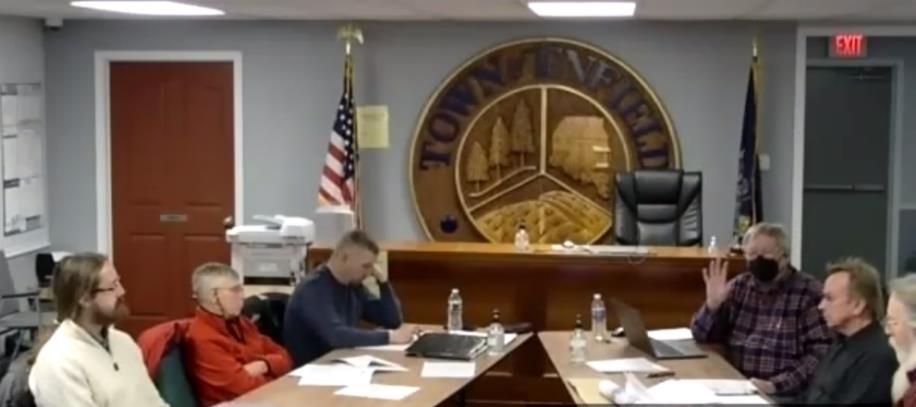
“People are building in Enfield, for one reason, because it’s cheaper in taxes; and for another reason, because of the guy sitting over there,” Carpenter said. He pointed to Enfield Code Enforcement Officer Alan Teeter, sitting in the audience.
“Because he is a sensible building inspector,” Carpenter said of Teeter. “He interprets the laws carefully so that his people do safe things and good things, but so that they don’t get pushed out being able to build in the Town by regulation that is so inappropriate that you can’t do it.”
Though not discussed at Wednesday’s session, Tompkins County this year embarked on a consultant’s study into possibly County Government assuming and consolidating code enforcement duties; taking them away from individual towns.
In commissioning the study, County planners and politicians had said they’d envision municipalities’ opting-into unified code enforcement only if they wanted to. Those who’d prefer to enforce their own codes could continue to do so. Nonetheless, the rules could always change. And the prospect of mandatory countywide enforcement worries some in Enfield (not the least of whom is this Councilperson-writer.) We need only look at how Tompkins County’s unique, half-century old, county-wide property assessment bureaucracy has grown increasingly detached from local control.
As those who are expert in the code enforcement field observe, New York imposes a common, state-wide building code. Localities can add to Albany’s rules only minimally. The key lies in enforcement. Does the building inspector enforce those mandates with a velvet glove or an iron fist? Most in Enfield like how Alan Teeter does it.
“Enfield is one of the last holdouts,” Carpenter said, contrasting his town with those neighbors that seek tighter regulation. “And we’re not doing a zoning law.”
During a Planning Board meeting in June of last year, Enfield Supervisor Stephanie Redmond made an offhand remark that town-wide zoning “is something we should consider.” But Redmond later backtracked, apparently sensing zoning’s local unpopularity. Planning Board members also last year expressed reluctance to zone. And while Redmond and some Councilpersons have since called for modestly-increased land regulation, they’ve avoided mentioning the “Z-word,” perhaps respecting the term’s toxicity.
During Wednesday’s Planning Board discussions, Supervisor Redmond offered few comments as she ran the meeting’s streaming controls. No other member of the Town Board participated. State law discourages their input.
“There’s more young people having babies, and the world is just getting way, way bigger,” Carpenter told the Planning Board. “And for me, being one of these reformer people, I’d say let’s put Enfield 50 years ahead of what the world is going to look like, and let’s start making our regulations in keeping with what the world’s going to be looking like 50 years from now, or 20 years from now, or whatever we can deal with.”
Carpenter did not offer specific suggestions Wednesday on how to fulfill his futuristic goal. But he did warn of what to avoid.
“Let’s not look at what happened in the past. Let’s not go to other people’s laws,” Carpenter said. “Let’s think ahead and say, how can we make Enfield a good place to live for everybody; for the new people coming in, for people that have lived here for a long, long time; and not make it the Republican method or the Democrat method, or the ‘I’ve-already-lived-here’ method, or the ‘I-need-someplace-to-live’ method.”
“I’d like at least to think about what do we want Enfield to look like in terms of residential properties in the future,” Carpenter added. “Enfield is a great Bedroom Town right now.”
Board member Henry Hansteen asked what that term meant. Carpenter replied that “Bedroom Town,” to him, meant “a whole bunch of residences, not much business, and there’s no shopping malls here.”
If that’s the definition; yep, that’s Enfield. Carpenter estimated three-quarters of his town’s morning commuters head east, toward Ithaca and Cornell.
Vision eventually stepped aside to make way for substance at the Planning Board meeting. Most carefully examined—in part, an outgrowth from the Ulysses discussion—was how a revised Site Plan Law should treat “flag lots,” those with minimal road frontage but with greater width away from the road and behind other parcels. Board Chair Dan Walker would tighten Enfield’s rules and require any new lot to have as much as 150 feet of road frontage to qualify for review as a “minor” subdivision. Any lot with less road frontage would demand more exacting review as a “major” subdivision. Right now, a subdivided flag lot with as little as 15 feet along the road—a state requirement—can be treated as “minor.”
“I don’t understand the road frontage, 150 feet… why that’s needed?” Hansteen asked.
“I’m not saying you can’t build lots that have 50 feet of frontage or 20 feet of frontage,” Walker said. “But you’re going to go through the major subdivision review process.”
Walker based his proposed revision, in part, on a preference that a flag lot, perhaps one from which many other homes would later branch, should be wide enough to accommodate a future road, and also allow planners’ review to consider future growth.
But Carpenter worried that such heightened subdivision review could burden the builder. “They have to do a whole lot of stuff and spend a whole bunch of money,” Carpenter warned. “And I don’t see that we need to do that.”
Homes set back from roadways are common in Enfield, and they’ve become more common with each passing year. Supervisor Redmond pointed out that she, herself, lives at the back of a quarter-mile driveway.
“It’s happening all over,” Dan Walker responded, noting vacant land’s increasing scarcity.
“People are trying to find a place to build a house,” Carpenter chimed in. He, too, lives far back from the road.
****
The meeting ended with Walker’s road frontage issue unresolved, though the Planning Board did appear headed toward widening a new lot’s required road frontage to at least 20 feet, so as to marry the requirement with that imposed by the state’s Fire Code.
“I think it needs at least 25 feet,” Carpenter interjected. Indeed, the width could widen to 50 feet before the Board’s work is done.
The Enfield Planning Board has set no deadline for completing its Subdivision and Site Plan Law overhaul. Any changes require formal approval by the Town Board.
For the Planning Board, patience and precision appear to outweigh expediency in revising the law so as to suit Enfield best.
“I am just concerned that if we’re going to do this in Enfield, let’s get it right,” Mike Carpenter said.
And of course, the unspoken edict, don’t mimic Ulysses.
###
February News Briefs:
One of the Good Guys:
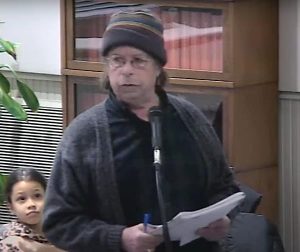
(Feb. 25): He’s one of the few grownups left in that disaster zone we call Ithaca City Government. And I cannot let the moment pass without noting—and regretting—the imminent retirement of George McGonigal from Ithaca’s Common Council.
With all 10 Council seats up for re-election this year because of redistricting, McGonigal announced February 21 he will retire as Alderperson at year’s end, thereby ending a decade of exemplary governmental service. No doubt, someone much more liberal—and more naïve—will take his place. That he or she will speed the City’s handbasket ride to that you-know-where. Thank God we’ll still have Cynthia Brock on Council, that is, unless another of the “children” knocks her off in the election.
You’d never call George McGonigal a fashion trendsetter. He often attended County Legislature meetings looking like he’d just come in from pruning trees and mowing yards (which, by the way, he does for a living.) A refreshing change. But more important, George has always been a plain-spoken, down-to-earth, and downright honest community advocate. When supposed “progress” messes up his West-End neighborhood, he lets you know it, and with words you’ll remember. He defends his city and its people in a way few do anymore.
McGonigal told The Ithaca Voice he positions himself among Ithaca’s “redneck-hippy contingency.” To me, he’s a part of our quirky little central city that’s rapidly, sadly, disappearing,. Best to you, George. You’ve served your people well. Soldier on. / RL
###
Newfield Ponders ARPA:
(Feb. 24): They could use some of the cash to buy a piece of land. But the Newfield Town Board spent most of its effort Thursday considering the prospect of spending most of its half-Million Dollar American Rescue Plan (ARPA) allocation on a “Creating Community Spaces” multi-faceted project that would include work at the Newfield Community Park, and most notably, expand the Town Hall.

Washington provided Newfield more than $519,000 through ARPA. A small fraction has already been committed. But $480,000 could be directed to “Community Spaces,” something Newfield had hoped Tompkins County would support with up to $250,000 through its Community Recovery Fund. The County zeroed out Newfield’s request.
“We have to spend it this year, Town Bookkeeper Blixy Taetzsch warned the Board about ARPA. “We don’t have a whole lot of time to explore other options.”
ARPA funding of “Community Spaces” would provide a $174,000 “Multi-Purpose Room” addition to Newfield’s Town Hall as well as construct an $87,000 basement add-on. It would renovate first floor Town Hall restrooms and build a $100,000 park pavilion.
“These are pretty broad, big brush numbers,” Taetzsch, admitted to the Board. The bookkeeper drove Thursday’s discussion. Having improved Town Hall accessibility and a larger meeting space, she told the Board, would in her opinion benefit Newfield considerably.
###
Money Short: Blame COVID:
(Feb. 24): At its Annual Meeting Thursday, the Enfield Community Council Board of Directors adopted a 2023 Budget that puts expenses over projected revenues by nearly $20,000. ECC leaders blame the COVID-19 pandemic for the shortfall, and they plan to ask the Enfield Town Board for a supplemental appropriation to give them a hand-up.

“We are now where we should have been two years ago,” Board member Debbie Teeter said as she presented the proposed budget. “I’d like a balanced budget,” Teeter said, but admitted that what she offered wasn’t that.
ECC officials blame the pandemic for fewer-than-expected bookings at their community center to host events, like weddings. The budget projects a more than seven-fold increase in building revenue for 2023.
###
Masking for the Doc:
(Feb. 21): You know who they are, bless their hearts: Those who will probably mask in public until the day they die (and die of something other than COVID-19).
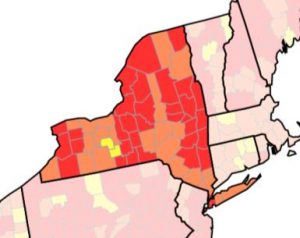
Locally, the ultra-cautious have friends in high places. In a Valentine’s Day news release, Tompkins County Health officials advised that even though the New York State Health Department has relaxed its masking mandates for medical facilities—albeit, only a bit—Tompkins County wants patients and personnel at local doctor’s offices to keep masking up.
“Healthcare facilities as defined in the guidance should continue to require mask wearing for both staff and visitors until such time that the transmission levels fall to medium or low,” said local Health Commissioner Frank Kruppa. “At that time, based on their own unique circumstances, facilities may choose to operate based on CDC level guidance.”
The terminology gets confusing. “Community Level,” the most commonly-cited metric, blends a trio of factors, including local hospitalizations and hospital capacity. “Community Transmission,” by contrast, focuses only on spread of the disease. Statewide and nationwide, the “Transmission” number is generally worse. As of February 16, Tompkins County stood at “Medium” Community Level, but “High” Community Transmission. Therefore, Kruppa wants medical masking to remain.
On February 14, only five in Tompkins County were hospitalized with COVID-19. No additional deaths were recorded during the week until then.
###
Deidra’s Backer Barken Bows Out:
(Feb. 14): The member of Ithaca Common Council best known for standing up to defend press freedoms announced Monday his plans to vacate his position at mid-year.

Third ward Alderperson Jeffrey Barken, first elected to Council in late 2021, confirmed to media that he’ll be leaving Ithaca government and Ithaca itself to “pursue other interests out of state.” He’ll resign in June.
Barken is best known beyond the city line for standing up to defend embattled former Tompkins Weekly reporter Deidra Cross last fall after Tompkins County officials allegedly intervened to bridle her reporting of comments critical of the City-County Reimagining Public Safety Collaborative. Cross alleges it was that official meddling that got her fired.
“From a writer’s perspective, the very thought of a government official or any outside entity, forcing the change of even one word against their will is a major affront to democracy” Barken said on the floor of Common Council last September 7th. “When ideology is blindly or systematically used to impose rhetoric regulating the free press, we have undermined our very ability to imagine anything at all.”
Jeffrey Barken’s courage and candor will be sorely missed in a City Government that, in my opinion, has lost both. I wish him well. / RL
###
Enfield Court Stays… for Now:
(Feb. 8): “It’s best to keep it local,” Enfield Councilperson Cassandra Hinkle remarked, expressing the strong majority view as the Enfield Town Board Wednesday postponed indefinitely further consideration of consolidating its Justice Court with that of a neighboring town.

Supervisor Stephanie Redmond had floated the idea of consolidation in December after long-time Enfield Town Justice Betty Poole announced her planned year-end retirement. Redmond first thought a merger would save space and money. But state law requires a town pay for justice services rendered by another municipality. “There’s no free lunch,” Councilperson Robert Lynch (this writer) reminded the Board.
Lynch also counseled that Enfield residents like their sense of community, something a local court system helps provide. Others agreed. Councilmember James Ricks initially thought money might be saved. But Councilpersons Jude Lemke and Lynch countered that moving court could actually cost Enfield in the long run, since it might need to subsidize space needs elsewhere that it can supply locally for free.
The Town Board agreed to postpone further discussion of court consolidation until it learns whether any Enfield Justice candidates emerge for this year’s elections.
###
No Need to Resign:
(Feb. 8): After a month of anxious uncertainty, Enfield Supervisor Stephanie Redmond announced to her Town Board Wednesday that Albany’s ethics rules will not require her to resign her office even though she’s taken a new, part-time job with State Assemblymember Anna Kelles.
Redmond disclosed in January that the State Ethics Board would conduct a routine investigation into possible conflicts-of-interest. “It’s fine to keep both jobs,” the Supervisor told the Town Board Wednesday after the Ethics Board made its determination. Redmond said the State will require she recuse herself in Town matters affecting state grants. She said she’ll assign someone else to handle those duties.
Redmond Wednesday announced her decision to recruit newly-arrived Enfield resident Greg Hutnik as her Deputy Supervisor, Hutnik replacing the resigning Isabel Castillo. In January, Hutnik joined the Enfield Planning Board as an alternate member.
Though Redmond’s choice of deputy is at her discretion, the Town Board perfunctorily affirmed her choice, and also commended Castillo for her two years of service.
###
County Passes Firefighters’ Exemption:
(Feb. 8): Dryden’s Mike Lane made his comment crisp. “Let’s pass this.”
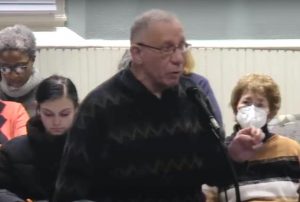
Without objection, and following a Public Hearing where this Councilperson spoke, the Tompkins County Legislature Tuesday opted-into a new state law permitting qualifying volunteer firefighters and ambulance workers to claim a ten per cent assessment exemption on the Tompkins County portion of their property tax bills.
The Enfield Town Board will likely approve a similar exemption on Town taxes February 8th. Newfield adopted the exemption earlier this month.
“Volunteer retention and recruitment is a very important need of fire companies in our rural communities,” I told the Legislature during its Public Hearing on the implementing law. “And this will help. It may help only on the margins. It does not solve the whole problem. We know that. But it does some good.”
Legislator Rich John admitted skepticism. “It just seems such a classic New York State complicated, bizarre approach to what is a systemic problem in our community and our county,” John observed. Yet he backed the local law. “I wish that there was something more substantive,” he lamented.
Dryden legislator Greg Mezey tacked on a last-minute amendment, one that urges all local towns, villages, and school districts to implement the exemption as well. / RL
###
Wanted: A Few Good Jailers:
(Feb. 8): After a lengthy executive session, which addressed several topics but consumed most of the time President Biden delivered the State of the Union, the Tompkins County Legislature Tuesday approved a bonus hiring plan to recruit new corrections officers at the County Jail.
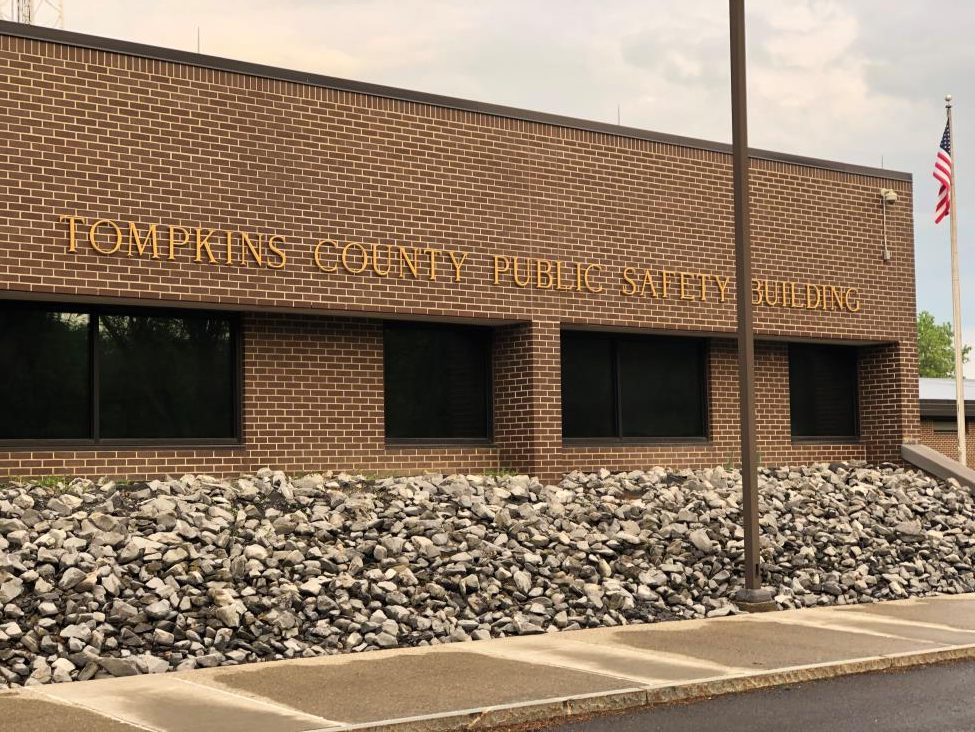
“The Sheriff’s Office is currently experiencing staffing shortages in our Corrections Division,” a County-authored News Release acknowledged the morning after the meeting. The new recruitment policy, contained in a Resolution circulated to legislators only during Tuesday’s meeting, and later amended after the closed session, would establish a sign-on bonus as high as $10,000 for what were described as “lateral transfer Corrections Officers.”
A $7,500 sign-on bonus will temporarily be provided newly-hired Corrections Officers, new recruitment made retroactive for those hired since January 1. Eligible candidates must be either new hires or those who left as Corrections Officers during the past year for reasons other than retirement. To be fully eligible, recruits must give the Sheriff a three-year work commitment.
###
At the Supervisor’s Right Hand:
(Feb. 6): “Nothing is constant except change,” they say. And that applies to Enfield Government.

On February 3rd, Supervisor Stephanie Redmond confirmed the impending departure of Deputy Supervisor Isabel Castillo, named to the deputy’s position in February 2021 and serving Enfield in the part-time position since then. Supervisor Redmond advised Town Board members that Ms. Castillo will depart her position to pursue “other commitments.”
At the start of her tenure, Isabel reviewed and signed Town vouchers. In later months, she helped organize community events like “Deck the Halls,” designed eye-catching flyers, and led initiatives toward parks and recreation opportunities in Enfield.
Expect the Town Board to recognize Isabel Castillo’s accomplishments at its meeting February 8th. Supervisor Redmond has yet to select a successor for what’s a discretionary appointment.
###

